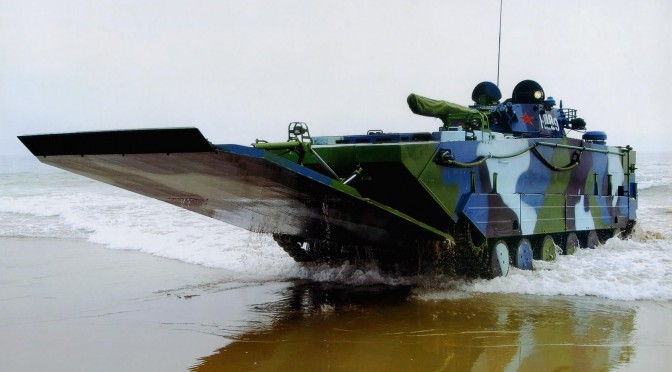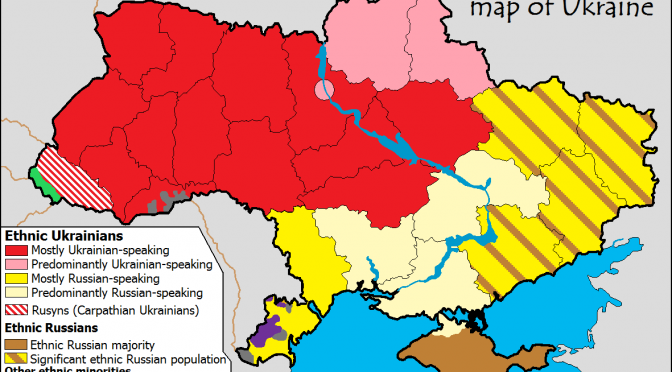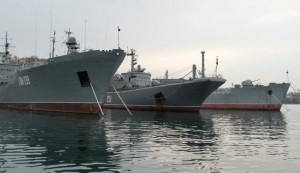China’s top maritime priorities will remain in the East and South China Seas. Nevertheless, extended expeditionary ambitions are real. However, more assertive Chinese behavior on blue-waters does not mean that great power conflict is inevitable. The upcoming East Asia Summit may be a forum for finding solutions.
Back to the USSR?
 |
| Global Soviet naval presence in the 1980s |
China does not seek an overseas presence as the Soviets did in the 1980s. They simply cannot do it yet. The USSR needed decades to establish a global naval presence. For China, it would not be different. However, the world is watching how China is on the march to reach the status of a ‘medium global force projection navy’, comparable to the British and French. In terms of numbers, but not in terms of quality, Beijing’s navy has already surpassed Paris’ and London’s and the naval armament goes on:
During 2013 alone, over fifty naval ships were laid down, launched, or commissioned, with a similar number expected in 2014. Major qualitative improvements are occurring within naval aviation and the submarine force, which are increasingly capable of striking targets hundreds of miles from the Chinese mainland.” (Source: USNI)
Moreover, ‘medium global force projection navy’ does not necessarily mean that there are warships in all oceans. It means that China could globally project power in one or two theaters simultaneously, if its political masters so decide. Besides the question of whether a Chinese naval presence outside the Pacific really would have a serious impact, political prestige must also be taken into account. Britain’s Indian Ocean presence does not make a difference. However, London decides to go there just because they can, and to pretend that Britain is still a global power. Beijing’s political and military elites might feel the same way. Often criticized is China’s military bureaucracy and corruption. However, for naval power projection, it does not matter whether Chinese officers in Xingjang or Tibet are corrupt Maoist bureaucrats.
The PLAN’s second aircraft carrier is under construction. Given a six-year construction time, the new carrier will be commissioned in the early 2020s. Present reports say, moreover, that China aims to build in total at least four carriers. However, except for a research program for nuclear-propulsion, there is not yet credible evidence that one of the carriers will be nuclear-powered.
PLAN carrier strike groups
Accompanied by two destroyers, two frigates and two submarines, China’s carrier has been deployed for the first time to the South China Sea. Militarily, Liaoning‘s trip may just have been an exercise. Politically, however, it was a clear message from Beijing: Our carrier can go to the South China Sea and we are there to stay. This has been the first “show of force” by a Chinese carrier strike group. More will follow. Simple exercises could have been done in closer home waters.
However, the more China invests in carriers, the less money will be available for other capabilities, like cruise missiles or submarines. Criticism on carrier acquisition often ignores that, after World War II, carriers have not been used in open-sea battle between major powers. Instead, carrier operations always targeted weaker countries or supported land operations. Due to the lack of combat experience, the Chinese would never act so irrationally that they would try to take on a US carrier strike group in open battle. If they would, it would end up in a slaughter. Chinese carriers would primarily go for show-of-missions targeted at inferior Indo-Pacific states, like Vietnam or the Philippines.
Moreover, in the earthquake, typhoon, and volcano plagued Indo-Pacific, Chinese carriers are much more likely to go for disaster relief rather than combat. Rather than fighting them, Chinese carriers will join their US counterparts in delivering water, food and medical care. Naval diplomacy and outreach to partners like Brazil will come along, too. However, wherever China’s carriers go, they will have ‘close friends’: US attack submarines.
Indian Ocean deployments
Since 2008 the PLAN has had a permanent naval presence in the Indian Ocean, officially in order to fight piracy. However, one side effect is the build-up of a new overseas presence. To understand what China could (not) do in the Indian Ocean it makes sense to look back at what the Soviets did. Their naval presence in the Indian Ocean (late 1960s – 1991) was normally between 5-10 surface warships and a few submarines. However, there were no Soviet carrier operations, just due to the lack of carriers. Moscow’s intentions were a show of force, surveillance of US activities (like the SIGINT station on Diego Garcia) and, in case of war, to open up an additional naval front to bind US capabilities, raid US supply lines and prevent US SSBN from striking Central Asia.
China faces the same challenges as the Soviets did: Access through vulnerable choke points; no direct supply line by land and therefore the need for bases or port access; no air bases for immediate air support. As a consequence, China’s approach would not be too different from the Soviets’. Even though the Somali pirates are in retreat and international counter-piracy operations will be downsized, China is likely to somehow keep an Indian Ocean presence out of its national interests.
The recent Indian Ocean exercises of the Chinese LPD Changbaishan accompanied by two destroyers underline Beijing’s extended expeditionary ambitions. That one of the PLAN’s most sophisticated vessels was sent indicates that further intentions exist. However, for a real deployment such a squadron would need supply ships and tankers.
Nevertheless, in India, China’s exercises caused concern about the Andaman and Nicobar Islands. Beyond India, weaker Indo-Pacific countries like Sri Lanka, the Maldives, the Philippines, and Vietnam were psychological targets of this show-of-force. In Australia, Changbaishan’s Indian Ocean tour led to the perception of a change in its strategic environment. Although a quick and limited tour, the PLAN’s Indian Ocean exercises obviously already matter.
Thus, we will see at least one, probably two PLAN frigates or destroyers in the Indian Ocean accompanied by a supply ship, maybe even an LPD. Port access may be granted by Pakistan, Yemen, Sri Lanka or Kenya. Thereafter, the PLAN could increase its presence gradually based on the gained experience, e.g. ship refueling on open waters. However, that does not mean that China will start fighting in the Indian Ocean. The most likely missions are counter-piracy, military diplomacy, disaster relief, evacuation of Chinese citizens, and contribution to other international operations.
Of the PLAN submarines, probably only SSN will continue to operate in the Indian Ocean, due to their operational range. However, unlike the Soviets there will be no Chinese SSBN west of Malacca Strait. Why send them straight into the range of Indian and US anti-submarine warfare capabilities? In home waters, the Chinese can protect their second strike capability with surface warships and air forces.
However, the good news is that China is not going to freeride on the stability in the Indian Ocean that is provided by others, namely the US. Beyond the discussions about conflict, China`s presence will contribute to safe and secure sea lanes and to stability in the wider Indian Ocean area. They will do so simply because it is in China’s national interest.
Beyond the Indo-Pacific
 |
| PLAN missile frigate Yangcheng in the Med (Source) |
After numerous friendly visits and a 2011 evacuation operation in Libya, the PLAN is now engaged in a real operation in the Mediterranean (Med’). Together with Danish, Norwegian, British, and Russian warships, one PLAN frigate is protecting Danish and Norwegian freighters transporting Syria’s chemical weapons to a US vessel for the c-weapons’ destruction. China’s Med’ deployment is hardly motivated by altruistic regard for what Europeans call “international responsibility”. Instead, the Chinese are just taking any opportunity they get to gain more operational experience.
In addition, China was only able to deploy to the Med’ due to its Indian Ocean presence. Nevertheless, it is remarkable that the PLAN operates in European homewaters from Cyprus, an EU member state. Interestingly, a Greek follower commented on this blog (comments are in German) that the EU is almost irrelevant in the Eastern Med’. Given his perspective is right, China stepped into a vaccuum provided by Europe. That is how maritime power shifts become real. However, once Syria’s chemical weapons are destroyed, probably in late 2014 or early 2015, China’s Med’ presence will end.
Moreover, we have seen Brazilian-Chinese exercises in the South Atlantic. Brasilia and Beijing seem to be happy with their naval cooperation, which makes its extension very likely. However, aside from the cooperation with Brazil and some friendly port visits, the debate about a Chinese presence in the Atlantic has remained purely hypothetical – and it will remain so for long.
Win wars without fighting
If Peaceful Rise ever was real, it is definitely over. China’s latest Defence White Paper clearly said that China aims to win local wars under the conditions of informationization. Moreover, the White Paper outlined that China would not attack first, but if attacked, it would strike back. However, the White Paper left open what China considers an attack. An attack does not have to be a kinetic strike, but rather China could consider other states’ activities in waters claimed by China as an attack on its national sovereignty.
After China’s soft power was ruined by not immediately responding to the need for disaster relief in the Philippines (they send their hospital ship very late and only after harsh criticism from abroad), China now lets hard power speak. Obviously, Beijing came to the conclusion that it is time to openly pursue a more assertive track, including the use of military power, which does not necessarily mean the use of force.
When talking about China’s military rise, many observers mistake the use of military power for use of military force. Using force is always is always inefficient, due to the costs involved. However, as Sun Tzu outlined, the most efficient way to win a war is not to fight it, but rather allocate military means in a way to impose one’s will on the other side without firing a shot. That is what China is trying to do. They do not follow the Clausewitzian dictum of open war as politics by other means.
 |
| China’s ADIZ |
China’s recently established ADIZ can be considered a test of this approach. They extended their sphere of influence by the use of military power, but without the use of force. As the test worked quite well from Beijing’s perspective, an ADIZ in the South China Sea could follow. However, China would need much more tanker aircraft for aerial refueling and aircraft carriers for enforcing an ADIZ in the southern South China Sea.
China is now actively seeking – with the use of military power as a means among others – control over areas it has not controlled before. More assertive Chinese behavior and Japanese responses increase the likelihood of unintended conflicts. The US, Japan, and South Korea will have to react to everything China is doing, because they have to save face. For that reason, maritime Asia needs a collective system of conflict prevention.
East Asia Summit: Forum for solutions
Maritime security will be a top geopolitical priority through this decade and beyond. In the 2020s, China and India, both with at least three aircraft carriers, will operate sophisticated blue-water navies. China will project power into the Indian Ocean, while India in response will demonstrate political will in the Western Pacific. Great power conflicts, with or without the use of military force, loom on the horizon, but is not inevitable. Therefore, maritime security will remain on forthcoming East Asia Summit’s (EAS) agenda.
Asian countries, in particular China and Japan, should agree to establish military-to-military hotlines for the opportunity to de-escalate unintended naval incidents. In terms of conflict prevention mechanisms, formal treaties are unlikely, because they would be hard to ratify in all states involved. However, by programs for mutual trust building and collective eschewal from un-announced unilateral measures, the EAS could establish a consensus for an informal modus vivendi in maritime Asia. The greatest plus of an informal modus vivendi would be that such an approach would allow all sides to save face.
Moreover, resource exploration (oil, gas, fish, minerals) have to be put on the EAS’ agenda. With ongoing globalization, increasing population, rising wealth and economic growth, sea-borne trade will grow even further, making these global economic lifelines even more vital for everyone. Now under research, deep-sea mining in the Indian and Pacific Ocean is likely to start in the 2020s. Competition over these resources will lead to the necessity to discuss how conflict can be prevented and how these resources can be used in a way that will suit all parties’ interests. If Asia manages to increase maritime interdependence in trade and resources among all countries and for mutual benefit, this makes armed conflict less likely. No country will strike its own lifelines.
Felix Seidler is a fellow at the Institute for Security Policy, University of Kiel, Germany, and runs the site Seidlers-Sicherheitspolitik.net (Seidler’s Security Policy).
Follow Felix on Twitter: @SeidersSiPo














